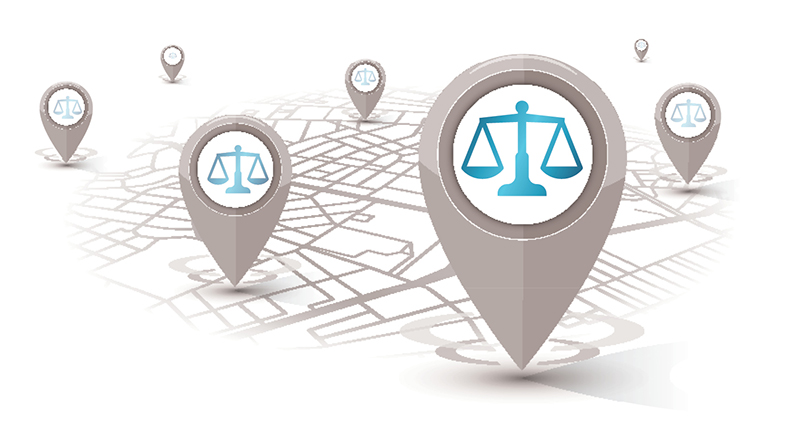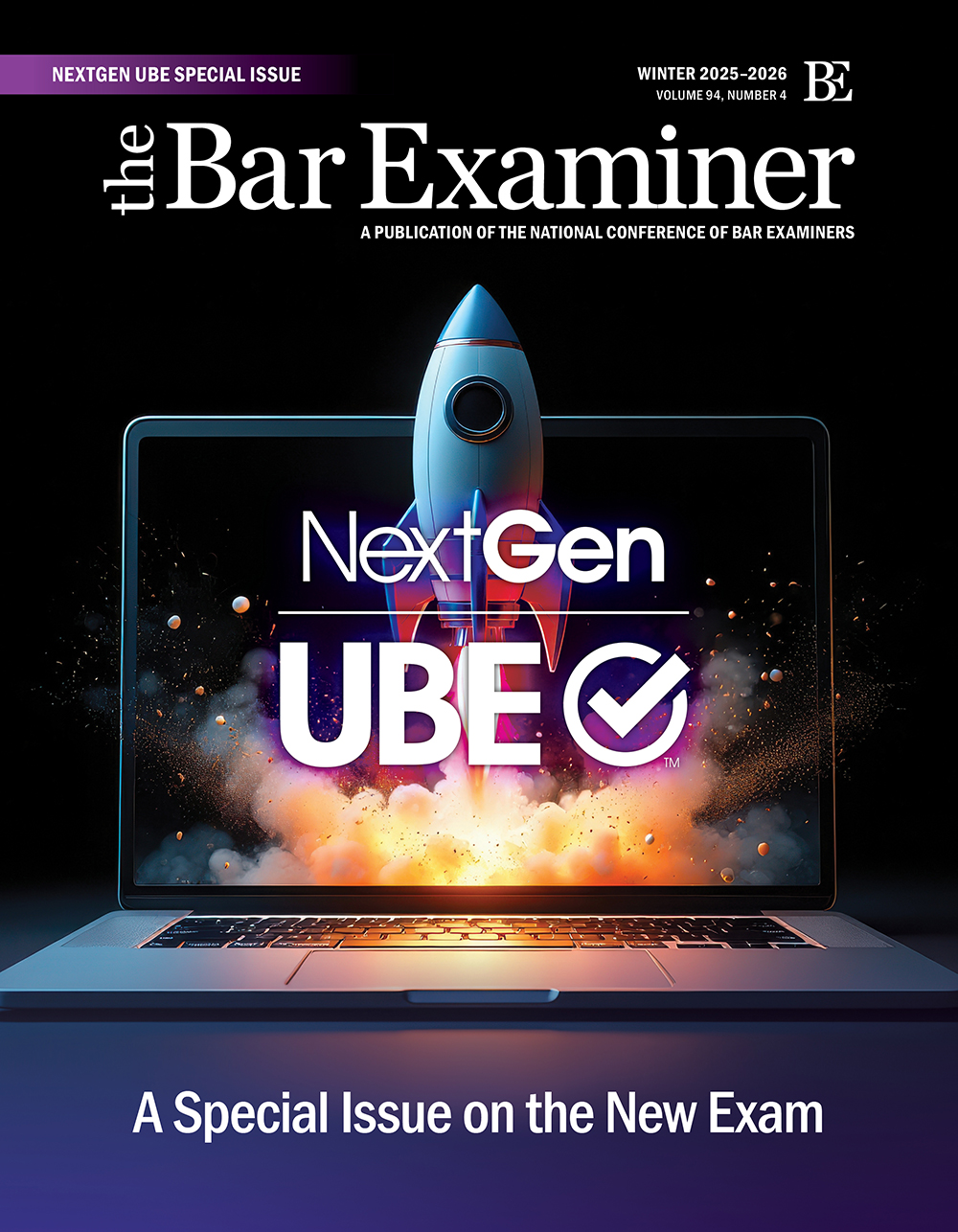This article originally appeared in The Bar Examiner print edition, Fall 2019 (Vol. 88, No. 3), pp 17–24.
Part One: North Carolina State-Specific Component, Maryland Law Component, and Tennessee Law Course
From Alaska to Maine, the Uniform Bar Examination is spreading across US jurisdictions, with the number of UBE jurisdictions now totaling 36. Among the decisions maintained by UBE jurisdictions is whether to administer a jurisdiction-specific law component—a separate test, course, or some combination of the two to assess candidate knowledge of law that is specific to the jurisdiction.
Of the 36 UBE jurisdictions, 15 have decided to require completion of such a component prior to admission. From video courses with quizzes to online multiple-choice tests, the eventual format of the component decided upon by each UBE jurisdiction is the result of careful consideration and a thorough development process meant to ensure that the jurisdiction’s new UBE admittees are sufficiently exposed to and have knowledge of the salient points of law specific to that jurisdiction.
This first part of a two-part section on UBE jurisdiction-specific components provides an overview of the 13 components that have been developed to date (those in Ohio and Texas are still under development), with an in-depth look at those in North Carolina, Maryland, and Tennessee. Look for the second part in the upcoming Winter issue for an in-depth look at those in South Carolina, Massachusetts, and the Virgin Islands.

UBE jurisdictions that administer a jurisdiction-specific law component are indicated in blue; those that do not are indicated in orange.
LEARN MORE:
Read the following article for an in-depth look at the development process for the jurisdiction-specific components in Missouri, Washington, Alabama, Arizona, Montana, New York, and New Mexico:
UBE Jurisdiction-Specific Components: Seven Unique Approaches (September 2016)
File "/var/www/vhosts/thebarexaminer.ncbex.org/httpdocs/wp-content/uploads/UBE-Table.xlsx" does not exist.
UBE Jurisdiction-Specific Components: An Overview
Missouri
Missouri Educational Component Test (MECT)
- Open-book online test with review materials consisting of 11 outlines (“Missouri Materials”).
- 33 multiple-choice questions pertaining to the outlines.
- Passing score of 28; applicant must retake MECT until passing score is achieved.
- (Missouri Board of Law Examiners, Missouri Educational Component,
courts.mo.gov/page.jsp?id=325)
Washington
Washington Law Component (WLC)
- Open-book online test with review materials consisting of 15 outlines
(“WLC Research Materials”). - 60 multiple-choice questions pertaining to the outlines to be answered in four hours.
- Passing score of 80%; applicant must retake WLC (with 24-hour or 72-hour waiting period for second or subsequent attempts) until passing score is achieved.
- (Washington State Bar Association, Washington Law Component,
wsba.org/for-legal-professionals/join-the-legal-profession-in-wa/washington-law-component)
Alabama
Course on Alabama Law
- Online video course set consisting of 8 learning modules.
- (Alabama State Bar, Admissions Office, Frequently Asked Questions, alabar.org/faq.action#171)
Arizona
Course on Arizona Law
- Approximately 6 hours of video instruction with supplemental materials and knowledge checks.
- (Arizona Judicial Branch, Arizona Law Course Online Registration,
azcourts.gov/educationservices/Committees/JCA/Online-Registration)
Montana
Montana Law Seminar
- Mandatory in-person course offered the Thursday following the bar exam.
- (State Bar of Montana, Admissions Information, montanabar.org/page/AdmissionInfo)
New York
New York Law Course (NYLC), New York Law Exam (NYLE)
- Online course and online open-book exam.
- Applicants view recorded lectures on 12 subjects covered by the NYLC and the NYLE and must answer questions during each lecture.
- Comprehensive course materials for the NYLC and the NYLE, and on which the NYLE questions are based, are available for study online.
- (The New York State Board of Law Examiners, NYLC & NYLE Course Materials & Sample Questions, nybarexam.org/Content/CourseMaterials.htm)
New Mexico
Class in New Mexico Law
- Mandatory in-person course offered the Thursday following the bar exam.
- (New Mexico Board of Bar Examiners, Required Class in New Mexico Law,
nmexam.org/event/required-class-in-new-mexico-law-7/)
South Carolina
Course of Study on South Carolina Law
- Course of study consisting of 11 video modules, 30 to 50 minutes in length each.
- Three true-false or multiple-choice questions at the end of each module.
- (South Carolina Bar, Course of Study FAQs, scbar.org/shop-cle/cos/course-study-faqs/)
Massachusetts
Massachusetts Law Component (MLC)
- 50-question multiple-choice exam with substantive outlines provided upon registration for the MLC.
- (Mass.gov, The Massachusetts Law Component (MLC), www.mass.gov/how-to/the-massachusetts-law-component-mlc)
Virgin Islands
Virgin Islands Law Component (VILC)
- Open-book, online 90-minute test based on outline materials.
- 50 multiple-choice questions pertaining to the outlines.
- Passing score of 70%; applicant must reregister to retake the VILC until passing score is achieved.
- (Supreme Court of the United States Virgin Islands, Virgin Islands Law Component, https://supreme.vicourts.org/offices_of_the_court/bar_admission/regular_admissions/virgin_islands_law_component)
North Carolina
North Carolina State-Specific Component of the Uniform Bar Examination
- Online course consisting of 6 one-hour video courses on 6 subject areas.
- Three quiz questions to be answered at the conclusion of each subject area video.
- (Board of Law Examiners of the State of North Carolina, Course Instructions, ncble.org/nc-state-specific-component-course-instructions)
Maryland
Maryland Law Component (MLC)
- Open-book, timed online test based on outline materials.
- 50 multiple-choice questions pertaining to the outlines to be answered in 90 minutes.
- A minimum of 40 of the 50 questions must be answered correctly; applicants must retake a new set of 50 MLC questions until passing score is achieved.
- (Maryland Courts, State Board of Law Examiners, Maryland Law Component, mdcourts.gov/ble/mdlawcomponent)
Tennessee
Tennessee Law Course (TLC)
- Online course approximately 7.5 hours in length with supplemental outlines.
- (Tennessee Board of Law Examiners, Tennessee Law Course, tnble.org/?page_id=57)
For the most up-to-date information on the details of a jurisdiction’s component, refer to that jurisdiction’s website. The descriptions above are based on the information accessed on these websites at the time of publication.
The North Carolina State-Specific Component
By Beth Fleishman
North Carolina adopted the Uniform Bar Examination in 2017; its first UBE administration was in February 2019.
Prior to North Carolina’s first administration of the UBE in February 2019, the two-day North Carolina Bar Exam consisted of 12 essay questions on North Carolina law on the first day of the exam and the Multistate Bar Examination (MBE) on the second day. While much of the North Carolina law tested by the former essay portion of the exam was in line with generally accepted fundamental legal principles—the principles according to which Multistate Essay Examination (MEE) examinees are instructed to answer MEE questions—it did cover certain aspects of law specific to North Carolina, which, of course, are not tested on the MEE.
The grading philosophy of the Board of Law Examiners of the State of North Carolina has been to value legal analysis, organization, and clear expression over the mere regurgitation of black-letter law, and to give a decent grade to a well-reasoned, articulate answer based on prevailing US law—even though it may have missed a distinctive point of North Carolina law. Nevertheless, the Board wanted to maintain the incentive that the essay questions had provided for applicants to the North Carolina bar to immerse themselves in North Carolina law.
Development of the North Carolina State-Specific Component
During the two-plus years’ process of “getting to the finish line” with the first administration of the UBE, the Board decided to create a particular kind of required course to achieve the objective of familiarizing applicants with North Carolina law—a series of online video presentations that applicants could view at their convenience, each presentation being followed by multiple-choice “hurdle” questions intended to confirm that the applicant had paid attention to the video. Successful completion of this course would be a prerequisite to licensure in North Carolina for applicants seeking admission to the North Carolina bar by exam or by UBE score transfer.
In selecting the subject areas for the videos, the Board had two considerations in mind. First, what subject areas in North Carolina are most likely to diverge from prevailing or general principles of law? Second—bearing in mind that not all newly licensed attorneys will find themselves in a practice setting that provides significant supervision—what topics might a new lawyer expect to encounter in a solo or small office practice?
Using those criteria, the Board selected six subject areas for the videos: Criminal Law, Estate Planning and Administration, Family Law, Real Property, Torts, and Workers’ Compensation. Thanks to a joint effort by the Board, volunteer representatives from the private bar with expertise in the six subject areas, and all seven North Carolina law schools, six one-hour online video presentations were prepared. Each video is a condensed review of distinctive points of North Carolina law for the starting lawyer and ends with three randomly selected “hurdle” questions. Failure to answer any question correctly will require the applicant to once more view the video and to again confront three randomly selected questions.
Administration of the North Carolina State-Specific Component
As soon as applicants to the North Carolina bar by exam file their applications to take the bar exam, they may email the Board’s designated administrative staff person to request access to the State-Specific Component course. Exam applicants must complete the Component either within the 24 months prior to the first day of the bar exam that they pass or within 12 months thereafter. (There are tolling provisions for service members engaged in active service.) While UBE score transfer applicants do not have a time limit for completion of the State-Specific Component, they must also complete it prior to licensure.
The course is not timed; applicants may stop and restart the video presentations at their convenience. Because the videos contain a significant amount of information, the Board encourages applicants to pause the videos to take notes during the presentations. Upon completion of all six videos, applicants are presented with a certificate on which they must enter their name and which they must print and submit to the North Carolina Board of Law Examiners. They must also sign and submit certificates verifying that they have neither provided nor received assistance, that they have not shared the link to the course with anyone else, and that they used the link solely for their personal completion of the course.
Our Experience
The launch of the State-Specific Component has been well received and has gone very smoothly thus far. Most exam applicants are eager to finish this portion of their licensing requirements as soon as practicable so that if they are successful on the bar exam, licensing can proceed expeditiously. UBE score transfer applicants have also generally completed this portion of their licensing requirements without delay to expedite their admission to the North Carolina bar. The North Carolina Board of Law Examiners is very satisfied with both the UBE and the State-Specific Component that it developed, which together provide assurance that new lawyers are well prepared to enter the practice of law in North Carolina.

Beth Fleishman is the outgoing chair of the North Carolina Board of Law Examiners, having completed 12 years of service on the Board.
The Maryland Law Component
By Jonathan A. Azrael and Jeffrey C. Shipley
Maryland announced its intention to adopt the Uniform Bar Examination in November 2017, enacted rules adopting the UBE in December 2018, and first administered the UBE in July 2019.
In implementing its Rules adopting the UBE, Maryland’s Court of Appeals1 included a requirement for applicants to the Maryland bar to complete an online Maryland Law Component (MLC). The MLC is required for applicants by exam or by UBE score transfer, as well as for experienced attorneys admitted to practice law in other US jurisdictions who seek admission to the Maryland bar without examination.2
Prior to its first administration of the UBE, Maryland had included 10 essay questions on Maryland-specific law as part of its bar examination. While the MLC is not part of the bar exam, it supplements the UBE by exposing applicants to state-law distinctions not covered by the UBE.
The purpose of the MLC is to “assure that newly admitted attorneys are familiar with key distinctions of Maryland law and procedure not tested in the components of the UBE and with core requirements for practicing law in Maryland, the violation of which may result in their authority to practice law being suspended.”3 In addition to substantive law distinctions, the Court directed that the MLC include Rules of the Court governing (1) attorney reporting requirements, (2) obligations to the Client Protection Fund and Disciplinary Fund, and (3) attorney trust accounts and the handling of client funds and papers.4
Development of the Maryland Law Component
Development of the MLC was charged to a Maryland Law Component Committee chaired by Circuit Court Judge Sherrie R. Bailey. Other members included representatives from the intermediate appellate court, the State Board of Law Examiners, and the two Maryland law schools, as well as four recent admittees to the Maryland bar. The Committee was supported by counsel at the Maryland Judiciary Legal Affairs Department.
Consensus was reached quickly that the MLC would be an educational tool and not a barrier to bar admission. The MLC would consist of written materials accessible online, focused on Maryland substantive law distinctions. To confirm comprehension of the written materials, applicants would successfully complete a timed, multiple-choice exercise based on the written materials.
The Committee agreed to include eight subjects on the MLC—those where Maryland law substantially varies from general legal principles and where Maryland civil and criminal procedural rules differ from federal rules: Criminal Law; Criminal Procedure; Evidence; Family Law; Maryland Civil Procedure; Professional Responsibility, including the Maryland Attorneys Rules of Professional Conduct; Torts; and Trusts and Estates.
The Committee recruited practicing attorneys, law professors, and members of the judiciary to draft written materials in the selected subject matters. These volunteers produced an excellent outline of distinctive points of Maryland law.5 A small subcommittee reviewed these materials for accuracy and edited them into a consistent format.
As the outline materials took shape, Committee and Board members developed a bank of over 400 multiple-choice questions based on the written materials. The Board is charged with the ongoing responsibility to update the written materials, assess the validity of the question bank, revise existing questions, and write new questions as required.
Administration of the Maryland Law Component
The Board makes the MLC available to applicants promptly after they apply to file a Notice of Intent to Take the UBE in Maryland or a Notice of Intent to Transfer a Qualifying UBE Score to Maryland. After reviewing the written materials, applicants answer 50 multiple-choice questions, chosen at random from the question bank; they must answer at least 40 questions correctly within the 90-minute time limit.6 Unsuccessful applicants may reattempt the MLC exercise as many times as they wish until they achieve a successful score. There is no specific deadline for applicants to complete the MLC; UBE exam applicants may complete the MLC either before or after they take the UBE and before or after receiving their exam results.
Our Experience
The Board provided access to the MLC to over 1,000 applicants in the first six weeks of its existence, with nearly 250 applicants successfully completing the exercise in that period. The Court and the Board view the MLC as an important element of their mission to ensure that new members of the Maryland bar meet the standard of minimum competence, whether they are recent law school graduates or experienced out-of-state attorneys seeking admission to practice in Maryland. Since Maryland has no mandatory continuing legal education requirement, the pre-admission MLC ensures that new admittees have an opportunity to become familiar with important aspects of Maryland law and procedure.
Notes
- The Court of Appeals of Maryland is the highest court in Maryland (commonly called the Supreme Court in other states). (Go back)
- Attorneys seeking special authorization to practice under Maryland Rules 19-218 (out-of-state attorneys affiliated with programs providing legal assistance to low-income individuals), 19-219 (military spouse attorneys), and 19-220 (legal assistance by law students) are not required to complete the MLC, due to the specific requirements contained in those rules regarding supervision by licensed Maryland attorneys. (Go back)
- Committee Note to Maryland Rule 19-212. (Go back)
- Maryland Rule 19-212 governs the content, timing, and participation requirements of the MLC. (Go back)
- The MLC Outlines combine criminal law and criminal procedure, effectively reducing the MLC subject areas from eight to seven. (Go back)
- Applicants granted extra testing time as an ADA test accommodation on the UBE in Maryland will receive similarly extended time to complete the MLC online exercise. Transfer applicants and Admission without Examination applicants previously granted extra time on a bar exam may request similarly extended time to complete the MLC. (Go back)
 f Law Examiners, a position in which he has served since 1995.
f Law Examiners, a position in which he has served since 1995.
Jeffrey C. Shipley is Secretary and Administrative Director of the Maryland State Board of Law Examiners.
The Tennessee Law Course
By Jeffrey M. Ward and Lisa Perlen
Tennessee adopted the Uniform Bar Examination in 2018; its first UBE administration was in February 2019.
When the Tennessee Supreme Court posted proposed rule amendments for the adoption of the UBE, those amendments included implementing a new post-admission course in Tennessee law for applicants to the Tennessee bar. Prior to its first administration of the UBE, Tennessee had included nine essay questions on Tennessee-specific law as part of its bar examination, and the Court still wanted to ensure that all new Tennessee attorneys had a basic knowledge of Tennessee law. Upon its implementation of the rule changes for UBE adoption, rather than including that portion of the rule amendments implementing a post-admission course, the Court instead established a committee to study the need for, feasibility of, and scope of a required course.
The Court eventually adopted the committee’s recommendation to require completion of such a course prior to admission for all applicants to the Tennessee bar. The resulting Tennessee Law Course, a 7½-hour online course with embedded questions, was launched in April 2019 and is a requirement for all applicants to the Tennessee bar—including those seeking admission without examination (comity), UBE score transfer applicants, and military spouse applicants.
Development of the Tennessee Law Course
The Tennessee Law Course (TLC) Committee established by the Court included members of and assistants to the Tennessee Board of Law Examiners, distinguished lawyers with expertise in Tennessee-specific law, and representatives from the Commission on Continuing Legal Education and the Board of Professional Responsibility. As part of its analysis, the Committee evaluated the written comments that had been submitted to the previously proposed amendments to adopt the UBE, which had raised concerns about new lawyers not being tested on or required to know Tennessee-specific law. Most commenters were in support of a required course or test on Tennessee law as part of the admissions process; however, there was no agreement as to the proper format, timing, producer, or content of such a course or test.
The TLC Committee examined the approaches taken by other UBE jurisdictions, assessed potential delivery mechanisms, and attempted to determine the best method to serve the public without placing any unnecessary additional burdens on applicants. It ultimately recommended that the Court require all applicants to the Tennessee bar to take a course prior to their admission that provides basic instruction in areas of Tennessee law that do not align with uniform codes or majority trends. It suggested topics for the TLC and recommended that the TLC be produced and managed by the Tennessee Board of Law Examiners in conjunction with the TLC Committee and reviewed by the Tennessee Supreme Court. It also recommended that the TLC content be reviewed periodically to add, modify, or delete content as necessary.
The Committee recommended that the TLC be delivered online, since requiring in-person attendance would be more expensive to deliver and more expensive for applicants. Online delivery was also anticipated to provide a more uniform and consistent presentation for all applicants. Finally, the TLC recommended posting outlines of course materials on the Tennessee Board of Law Examiners’ website as a resource for all Tennessee lawyers.
The Court adopted the recommendations of the TLC Committee, and the Committee began work to produce the TLC on distinctions in Tennessee law covering the following topics: Administrative Law (Tennessee Claims Commission, Employment Law, and Workers’ Compensation); Business Associations; Constitutional Law; Criminal Law and Procedure; Family Law; Professional Responsibility; Property; Tennessee Rules of Civil Procedure, Evidence, and Appellate Procedure; Torts; and Wills, Estates, and Trusts.
Faculty from each of the six Tennessee law schools, all members of the Tennessee Board of Law Examiners, the Assistant Examiners,1 and the TLC Committee members worked on the outlines and scripts for the course. Those materials were subsequently reviewed and edited by the Court, Court staff attorneys, other law school faculty, and experts in the field. After approval of the outlines and scripts, the Court selected presenters for the TLC, which included judges, members of the Tennessee Board of Law Examiners, Chief Disciplinary Counsel for the Tennessee Board of Professional Responsibility, a law school professor, and practicing lawyers with recognized expertise in certain areas of law. Each section of the course was recorded on video for incorporation into the online presentation.
Administration of the Tennessee Law Course
The Tennessee Law Course is a 7½-hour online course with multiple-choice or true-false questions embedded approximately every 15 to 20 minutes or at the end of a shorter segment. Applicants are required to answer the embedded questions correctly to proceed with the course. Those who answer an embedded question incorrectly are redirected to the beginning of the segment and must view it again before having a chance to answer another question. The TLC is not graded, but viewers must complete all segments and correctly answer the embedded questions.
The cost to applicants is only $15.2 The TLC can be accessed upon completion of the UBE in Tennessee or approval by the Board for UBE score transfer, military spouse, and comity applicants. The TLC must be completed prior to the expiration of a UBE score (three years).
Our Experience
Since the TLC’s launch in April 2019, over 300 applicants have viewed and completed the course. Comments are favorable, and the outlines posted on the Tennessee Board of Law Examiners’ website have proven to benefit not only newly admitted lawyers in Tennessee but also seasoned Tennessee practitioners.
Notes
- Assistant Examiners, prior to the adoption of the UBE, wrote and graded the Tennessee essay questions. They continue to grade the written components of the UBE. (Go back)
- The $15 represents the cost of the license and minimal administrative costs. Because applicants cannot access the TLC until they complete the exam or eligibility requirements, not everyone who applies actually receives access to the TLC. Rather than raise the application cost, the Court opted to pass along the cost at the time applicants become eligible for the course. (Go back)

Jeffrey M. Ward is a member of the Tennessee Board of Law Examiners and chair of the Tennessee Law Course Committee.

Lisa Perlen is Executive Director for the Tennessee Board of Law Examiners.
Contact us to request a pdf file of the original article as it appeared in the print edition.








